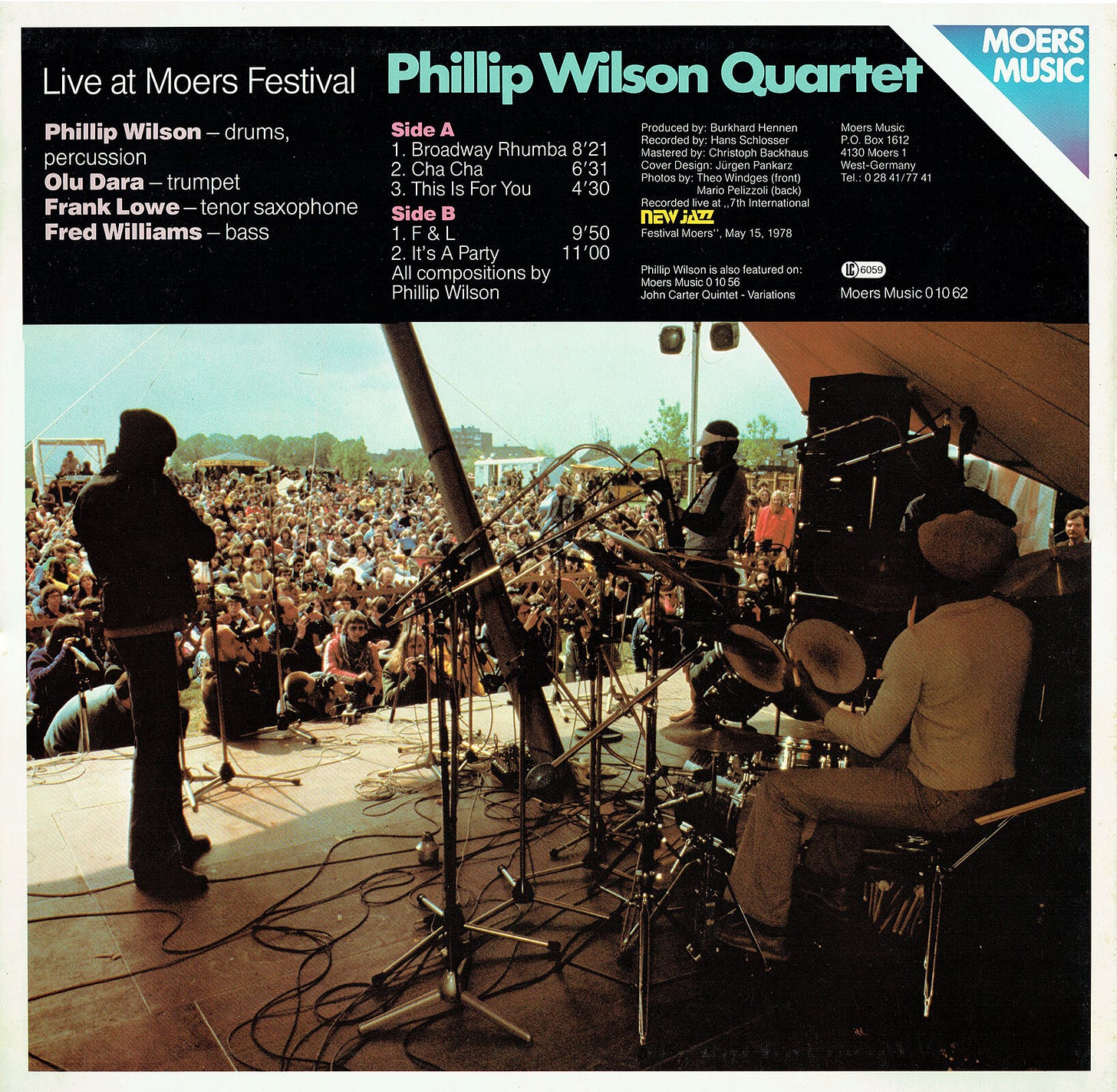Genre distinctions are meaningful and persistent, but we sense, deep down, that music is one thing- one experience, one practice. Drummers know this, and demonstrate it in their playing.
Drummers know that a groove which makes people move can be modified to fit any musical situation; that all grooves are just variations, that genres of music are more similar than different. Some drummers, following the course of their lives, seem to prove, beyond any reasonable doubt, what we might call the oneness of music.

Phillip Wilson is perhaps best known today as the drummer on Dogon A.D., alto saxophonist and composer Julius Hemphill’s 1972 avant-garde masterpiece featuring himself and Wilson with Abdul Wadud on cello and Baikida Carroll on trumpet.
On the title track, Wilson’s single-headed toms and commitment to the hard-hitting 11/8 funk groove, from which he scarcely deviates for 14 minutes, are standouts. On this track, Wilson is immediately identifiable; no other drummer sounded like this, then or now. His command of a repetitive part- his groove is almost the hook of the song- and contemporary drum sound subtly connect Hemphill’s music to James Brown, Chicago blues, and rhythm and blues. With Wilson in the driver’s seat, Dogon A.D. is simultaneously abstract and direct, earthy and intellectual, strange and familiar.
By his late teens, Wilson was a jazz drummer. He parlayed a gig with organist Sam Lazar, best known for his 1960 instrumental hit “Space Flight” (Wilson is not on this track)1 into a move to NYC in 1961, playing for a time at Minton’s Playhouse. Returning to St. Louis, Wilson improvised songs with Lester Bowie and Julius Hemphill in parks, had a brief stint touring with Motown acts, and then relocated to Chicago, where he joined the Roscoe Mitchell Quartet, soon to be renamed the Art Ensemble of Chicago.
While rehearsing with the nascent Art Ensemble, Wilson made his living in Chicago playing with blues musicians, including harmonica legend Little Walter. The blues gigs put Wilson in touch with the handful of young white musicians who’d been accepted as acolytes of the Chicago blues masters. Perhaps the most ambitious of these was harmonica player Paul Butterfield, who asked Wilson to join his band in the summer of 1967, just as Wilson was making the first recordings with Roscoe Mitchell’s Art Ensemble.
With Butterfield, Wilson recorded three albums, played at the 1969 Woodstock festival (Wilson is co-author of the tune “Love March”, the Butterfield track on the 1970 Woodstock album), and persuaded Butterfield to hire a young alto player friend of his from St. Louis, David Sanborn.
After Butterfield, Wilson recorded an exquisite soul/funk/R&B/rock album, Full Moon (Douglas Records), playing beautiful backbeats and even sharing vocal duties with ex-Butterfield Band mates Gene Dinwiddie and Buzz Feiten. Full Moon and Dogon A.D. were both recorded in the same year, 1972, and possibly within a few weeks of each other.

Wilson relocated to NYC in 1976, where he played in lofts and clubs and recorded with, in his own words, “all of them cats I knew from up north, down south, way out west- David Murray, Julius Hemphill, Oliver Lake, Roscoe Mitchell, Muhal Richard Abrams, James Newton. They came here and put some fire in the NY scene.”2 Anthony Braxton was around too; Wilson is in the percussion section for Braxton’s classic Creative Orchestra Music 1976 on Arista.
There was more. Wilson recorded duets with both Lester Bowie and trumpeter Olu Dara, released an album of his quartet at the Moers Festival, and recorded with the Rance Allen Group, an important gospel group, on Stax. Finally, there is Lester Bowie’s Brass Fantasy, the brass band with which Bowie explored the myriad connections between the marching bands of his youth and every strain of jazz, pop and R&B. Their two mid-Eighties ECM albums, I Only Have Eyes For You (1985) and Avant-Pop (1986), feature Wilson connecting, connecting, connecting.

Perhaps no other musician has as wide a range, connects more disparate music scenes, social groups, and social music practices, then Mr. Wilson. I know of no other drummer in whose playing the common heritage between straight-ahead jazz, the avant-garde, and pop music is so explicit. In every band, in every scene, Wilson was no interloper, no visitor; he belonged, was the perfect player for the situation.
What stands out and inspires me is how little he modulated his voice, whether he was playing with Paul Butterfield, Sam Lazar, Roscoe Mitchell, Lester Bowie, or Julius Hemphill. Wilson was not a chameleon, changing his playing to fit into a musical situation. He was simply, or complexly, himself, all the time! His charismatic, infectious feel and distinct drum sound (single-headed toms!) is recognizable in any situation; there is no chance of anonymity with Phillip Wilson.
Mr. Ethan Iverson graciously undertook a public service by interviewing Mr. David Sanborn about Phillip Wilson. Here’s that interview where Mr. Sanborn gives full-throated praise for Mr. Wilson’s musicianship and generosity. This wonderful interview kept Mr. Wilson’s name in the conversation; thank you David Sanborn and Ethan! I hope this brief tour of Wilson’s biography and notable recordings does the same.
Phillip Wilson is one of our most important drummers, a singular voice whose contribution to American music in the post-war era is as large as anyone’s. His exuberance, his commitment to the music, regardless of style, his flow of ideas-just as evident in playing a repetitive beat or improvising- and his instantly identifiable sound connect the worlds of jazz, blues, gospel, rock, funk-soul-R&B, and avant-garde improvisation, all of which he played on the highest possible level. This is a life’s work, successfully carried out.
https://www.youtube.com/watch?v=S4wj7Vt3czk







More Stories
CD review: George Benson – Dreams Do Come True: When George Benson Meets Robert Farnon – 2024: Video, CD cover
The band was tight as ever. The Warren Haynes Band cuts loose: Video, Photos
Interview with Alvin Queen: Feeling Good – I heard these tunes played by … Video, new CD cover, Photos